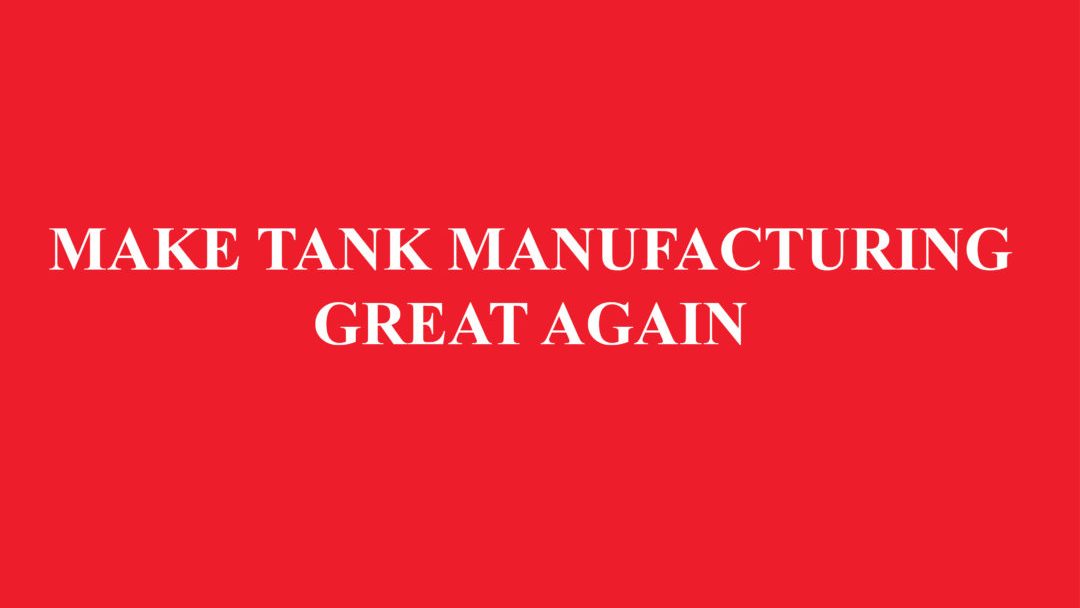Although I’m certain MTMGA isn’t as catchy and won’t be as popular as the famous MAGA acronym, in the world of manufacturing, and in particular the world of steel fabrication and manufacturing of steel products, it’s every bit as important to us. Without weighing in on any political side or debate, as that’s not the point of this article, I do believe we can all acknowledge that we are indeed in the throes of a robust economy and overall positive business environment.
Throughout the political debates and continuing past the election of our current POTUS many of us (again business lens here) are energized by the promise and energy surrounding the return of jobs to the United States. We were equally excited that blue-collar skills and jobs were being respected and trumpeted once again for the overall value they bring to our nation and its ability to compete and sustain on a global level. The very same jobs, opportunities and manufacturing prowess that served the rise of our nation to prominence and affluence had seemingly been forlorn and forgotten since the Reagan era.
It now feels like we’re benefiting from that energy and from the loosening of burdensome government regulation and taxation that serves to stifle much of our excitement and opportunity in the private sector, specifically among manufacturing of steel products and steel fabrication in general. With this turnaround, we now face an entirely new set of problems that come from rapid growth, consumer and investor optimism and the overall boom in the business realm. Those questions are as follows:
Where do we find the people for these jobs?
Many trades have a shortage that puts quite a strain on their respective markets. Welders and skilled construction workers are among those, as well as engineers and positions all the way to purchasing/supply chain managers. Increasing wages may help attract talent, but only to the level that the talent is available. Truck drivers in some regions are now commanding healthy six-figure salaries and sign-on bonuses, and yet the shortage continues. These shortages and high-wage burdens often shift the heaviest weight to the small business trying to compete with corporate America.
Add to the above that our country is in the throes of the immigration debate with tightening reform and enforcement ever more popular and the misinformation and propaganda created in the political fight therein, and it’s also more difficult to attract foreign workers for these positions.
How do we close a skills-gap that is decades old?
The narrative in our country has for so long been sold as “college or bust” that we’ve created enormous debt-loads on our younger generations for little to no practical skills. We’ve collectively allowed the lie to grow that college is the only real way to prosperity and the American dream. In this, we’ve created a complex for those who prefer to work with their hands in skilled and vocational trades. Trade schools all over our country have been run as if they are a dumping ground for under-achievers and kids not intelligent enough for college. In turn, we’ve also duped many who genuinely aren’t, nor should be, college material into wasting time and resources pursuing that glorified and ridiculously overvalued piece of paper while simultaneously steering away promising minds who would be more satisfied pursuing careers in just such trades.
We cannot reverse nearly three decades of effort to convince people these aren’t worthy careers overnight. This will take some time. Time that booming economies don’t have the luxury to wait for. So although it may bode well for our future that the dialogue and correction begin now, it does little to solve the current problem.
Where do we find the raw resources and products and supply-chain?
The same principles that guided us head-long into globalization when it presented and easy economic growth track are the ones that now hamper us when the manufacturing returns. Our businesses find themselves in the beginning stages of a global trade war. Though it’s nice to know jobs and opportunities have and are returning, that does little console the small, young or even established businesses that are forced to rely on imported goods for their production and currently have very few sources to turn to domestically. To this point, I’ve not found or heard of import tariffs to have crushed industries working with steels that are affected; however, how far can this go before that does indeed happen? Shuttered steel-mills don’t just re-open overnight. It’s often a years-long process to ramp production back up and hire and train necessary personnel.
Returning domestic manufacturing and supply of crucial resources is a lengthy, expensive and time-consuming endeavor.
With these questions laid out and the seeming trend of this discussion pessimistic, allow me to offer some suggestions and move to the point of this writing. The thoughts above and in continuing will reflect more on industries where I have more extensive knowledge such as steel fabricating, specifically in tank and vessel production for various industries. I will operate off the assumption that many of the challenges and also solutions discussed will apply throughout multiple sectors of manufacturing.
What is the key?
To answer that, we must put our pride aside. This is a difficult thing to do for many of us Americans. Living and breathing in one of the greatest countries the world has ever seen either makes us swell with pride and patriotism or so comfortable we can allow social justice warriors in capacities struggling nations could never fathom. This is another topic indeed. I’m ultimately asking you for one simple thing as you read on, never apologize for your belief in and devotion to our great nation, but let’s not let it blind us either.
America is great in many ways. Americans are great in many ways. America has fallen behind in many ways. I know, it hurts to admit it. It’s not easy to swallow our pride. For years I’ve been guilty of and dealt with companies who were guilty of the assumption that because we are the United States of America, we are automatically the greatest at everything. Unfortunately, no one person or even nation can be the best at everything.
Let’s get down to it…
Now that the hard part is out of the way and let’s keep moving. My experience as an executive in companies that produced API tanks, ASME vessels and engineered to order high-pressure ASME vessels and plants for the natural gas industry taught me so much that I didn’t know from merely being on the equipment representation side. I didn’t know what I didn’t know to that point and was fortunate to learn. It’s made me all the better and all the wiser in my understanding of what my customers and their companies need to succeed and advance in the markets and economy of today and the future.
I’ve been fortunate to have this same experience in my current position. It has allowed me to visit, observe, question and ultimately learn not only from manufacturing operations all over North America but also Europe, as well as a few other regions. The education I received has been quite the revelation: We (America) aren’t the most advanced at everything. We’re behind in technology, skill-set, methods and overall efficiency in the vast majority of our tank and vessel production, and I have no doubt this carries over to various other steel fabricating sectors.
To visit shops in the Netherlands, Germany, France, Italy, Austria, and Norway and observe the overall efficiency, innovation, investment in technology and commitment to quality is quite stunning. Now, I’m sure that like any industry there are also low quality and inefficient producers in these countries as well, but I’m focusing here on what I have more experience in observing.
I can’t answer the “why” about how this has come to be. I can only point out what I’ve learned, and that is that they commonly employ people with higher skill-sets, invest in more technology, and are more staunchly committed to overall efficiency. When these things are implemented in any company, the chances of success and survival increase exponentially. My suspicion would be that due to the higher regulation, tax-burden and labor costs in these respective countries, they were forced to invest in technology and higher skilled labor in order to maximize efficiency.
Several times I’ve arranged visits for executives, owners and other key decision makers for U.S. companies to visit factories in the countries I’ve mentioned. Each time it seems these same people come in with the same mindset I had: We’re a big fish and an industrialized nation, I hold out little hope any company here knows something we don’t. And yet, they do.
This is part of the reason why our company, Fabrication Solutions & Technologies has been so successful in a relatively short amount of time. Our company is only now three years old; however, our parent company and partner has been designing equipment, solutions and other technology to serve these markets abroad since the 1950’s. They have a global view, experience, and mindset. In short, they knew from experience, what we didn’t know.
It’s very easy to develop tunnel-vision and be trapped inside the world we know. It happens to most all of us. With this said, the answer to Making Tank Manufacturing Great Again in our country is to open our minds and take a common-sense approach. Investing in technology, improving the average worker’s skill-set, and being committed to overall efficiency is the answer to not only keeping your company alive but thriving. You must move out of the traditional, labor-intensive, low-tech methods of manufacturing. Those methods may have been cutting-edge decades ago, but things change. Technology improves. Methods improve. There is a better way to make a better product while reducing overhead and producing a better product. IMCAR Vertical Systems for Tank Production™ are the way.
Don’t get left behind because you’re blinded by pride. We should always seek to learn, grow and be better. Me, you, all of us. If you are a tank and vessel producer and you’re reading this, contact our team at Fabrication Solutions & Technologies, an IMCAR company today. We can help your company take the steps that help move your operation into the future. Your long-term survival may well depend on it.
By contacting FST, you can take the first steps in leading your operation to MAKING TANK MANUFACTURING GREAT AGAIN! Links to our website and product videos below (for more information or to schedule an in-shop evaluation contact [email protected]):
IMCAR Vertical Systems™: https://www.youtube.com/watch?v=iC1QW2PVgy8
FST/IMCAR customer featured in The Fabricator magazine: https://www.thefabricator.com/article/bending/the-next-generation-of-vessel-and-tank-production

